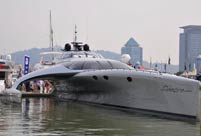 Canadian Governor General arrives in Shanghai
Canadian Governor General arrives in Shanghai
 Giant fish head with diced hot peppers recorded in China's Changsha
Giant fish head with diced hot peppers recorded in China's Changsha
 China's North Sea Fleet holds training on missile launch
China's North Sea Fleet holds training on missile launch
 2013 World Yacht Ceremony opens in China's Sanya
2013 World Yacht Ceremony opens in China's Sanya
 2013 Nobel Prize winner: China's real estate bubble is serious
2013 Nobel Prize winner: China's real estate bubble is serious
 Artists perform Huangmei opera in Jinan
Artists perform Huangmei opera in Jinan
The weekend of Sept 21 was a busy one in Qingdao, in China's eastern Shandong province. The seaside town known for its beaches, beer and fish hosted some of the most famous actors in the world.
Leonardo DiCaprio and Nicole Kidman were there. So were Ewan McGregor, John Travolta, Zhang Ziyi, Jet Li and Tony Leung. They were mostly for decoration. The star of the show was really Wang Jianlin, who has become the richest man in China thanks to his Dalian Wanda group, a real estate and entertainment conglomerate.
Wang brought these celebrities to the party to announce an $8 billion mega studio and theme park in this city. If it comes to pass, the tentatively named Qingdao Oriental Movie Metropolis and its 100 film studios and theme park will add significantly to the service column in China's GDP calculation.
The government is keen to expand the service sector in the economy because it would mean less reliance on manufacturing for growth. At the same time, more expenditure on this sector would signal that the Chinese have stepped up to the plate.
"The service sector is not mature compared with the industrial sector," says Zhao Hong, a researcher at the East Asian Institute of the National University of Singapore. "It is still small but has potential because China is adjusting its economic structure."
This year could be a turning point in the development of the Chinese economy. For the first time in recent history, the service sector could overtake industry in its contribution to the economy. In 2012, services accounted for 44.6 percent of China's GDP while industry was responsible for 45.3 percent. Numbers for 2013 are not out yet, but services have been growing faster than industrial production.
GDP is made up of the value of all goods and services produced in an economy. In simple terms, it is measured by adding consumption, investment, government purchases and net exports. The consumption category is further divided into goods and services.
Services include products such as insurance, healthcare and tourism. A typical tourist on a trip during the holiday week at the beginning of October could have bought airline or train tickets and hotel rooms — all services.
About a week after Wang Jianlin's party in Qingdao, on Sept 29, the Shanghai free trade zone (FTZ) was officially launched in much more subdued fashion. In an area of 28 square kilometers, the government plans to allow for full convertibility of the yuan, freer flow of capital, and banks that qualify will be allowed to do offshore business.
Companies will be allowed to import goods directly into the zone before going through customs. In theory, both domestic and foreign companies will be allowed to invest in banks, shipping companies, entertainment services, schools, health and insurers that operate in the zone, even if there are more than 1,000 areas that still remain off-limits to investors. As in Qingdao, the FTZ could add to the services column.
More than signifying a continuous rebound in economic activity, increasing non-manufacturing activity underscores the government's efforts to change the structure of the country's economy.
For the time being, some parts of the service sector is yet to be fully open to non-State investors.
Foreign players that can invest with ease in most industrial sectors have a more difficult time investing in services such as banking, accounting or legal services. The new and much awaited Shanghai FTZ could mark the beginning of wider opening of the service sector to international competition, but there have been few details of what exactly the zone will do.
"The government is aware that they need to reform. They are losing capacity in the traditional industries," says Stuart Allsopp, head of Asia country risk and financial markets at Business Monitor International. The FTZ is a move in the right direction, he believes, even if details remain sketchy. For example, foreigners will be able to invest in things such as schools.
The current 12th Five-Year Plan (2011-2015) calls for services to contribute about 47 percent of GDP by the end of the period in 2015. That would represent a small gain of about 2 percent from current levels, but would cement services as the biggest single contributor to the country's GDP.
Zhao believes this target is very reachable. Within three to five years, he says, services could account for as much as 50 percent of the economy.
China's GDP in 2012 (at current rates) was $8.23 trillion. Services accounted for just under 45 percent of that, a little less than $3.7 trillion, according to official figures.







 No news of survivors in Lao Airlines crash
No news of survivors in Lao Airlines crash Five fighters in flight training
Five fighters in flight training London mayor hails free trade, subway system on China tour
London mayor hails free trade, subway system on China tour Admirers to bid joyful goodbye to Rubber Duck
Admirers to bid joyful goodbye to Rubber Duck Photo story: For the last three students
Photo story: For the last three students  Photo story: A day in the life of a car model
Photo story: A day in the life of a car model Chinese screen goddesses from Beijing Film Academy
Chinese screen goddesses from Beijing Film Academy  Weekly Sports Photos
Weekly Sports Photos World's most amazing yacht on display in Guangzhou
World's most amazing yacht on display in Guangzhou Bayi Parachute Team of PLA Air Force
Bayi Parachute Team of PLA Air Force Cold air sweeps through N China
Cold air sweeps through N China The last family in shantytowns
The last family in shantytowns UNESCO world heritage site: Montale Tower
UNESCO world heritage site: Montale Tower U.S. Senate leader announces bipartisan deal
U.S. Senate leader announces bipartisan deal Fiber-optic wedding dress show shinning in Suzhou
Fiber-optic wedding dress show shinning in Suzhou Day|Week|Month